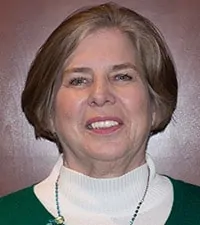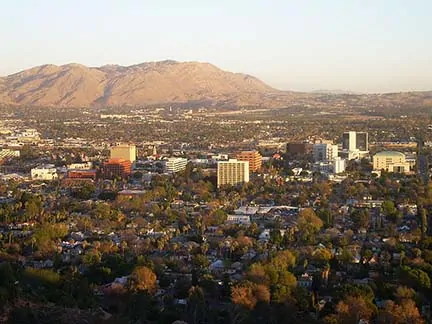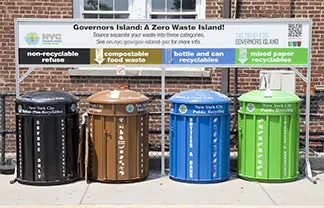

SCS Engineers provides a free guide to the most common environmental reports due at the federal and state levels. Each guide includes an overview of the reporting due along with the date each state requires submission.
When SCS says free, we mean it. No need to submit your company name, no endless email trail will follow; these are free guides to download and share with others from the compliance experts – SCS Engineers.
Click to download or share each state guide:
If your state is not listed, contact the nearest SCS office to speak with a compliance professional in your area and in your business sector; SCS is nationwide.
If you have questions or need help sorting out details such as which reports apply to your business or step-by-step support on how to prepare your reports in the states listed above, contact our regional professionals.

Learn more about Ann
Ann O’Brien 1-773-775-6362
Learn more about Cheryl
Cheryl Moran 1-608-216-7325
Recycling markets are moving targets and create volatility that makes it difficult to anticipate market change. However, by controlling contracts you have a much better chance to implement a financially sustainable operation. Tracie and Michelle review managing costs and nine other important components in this engaging article.
Processors and municipalities have many considerations when establishing a recycling contract. Processors who seek legal assistance and are open about their concerns during the process can find ways to develop a contract that is sustainable for both processor and the community being serviced.
Read and share the full article here.
About Tracie Onstead Bills and Michelle Leonard
Under section 211 of the Clean Air Act, the Environmental Protection Agency (EPA) is required to set renewable fuel percentage standards every year, including for cellulosic biofuel, biomass-based diesel, advanced biofuel, and total renewable fuel. In November the EPA established the 2017 standards, which will apply to all motor vehicle gasoline and diesel produced or imported in the year 2017. Most biogas produced qualifies as Advanced Cellulosic Biofuels, or the D3 category, which is the same as cellulosic (non-corn) ethanol. For the last several years, nearly 95% of the advanced cellulosic fuel generated has been from digester and landfill biogas, not cellulosic ethanol.
The final rule also establishes the four percentage standards applicable to producers and importers of gasoline and diesel, based on volume requirements. Renewable Fuel Volumetric Obligations (RVOs) are expected to continue driving the market to overcome constraints in the renewable fuel distribution infrastructure. This, in turn, could lead to substantial growth over time in the production and use of renewable fuels. If a renewable fuel-producing project uses a Renewable Fuel Standard (RFS)-approved pathway and is registered with EPA, the project can generate credits that can be sold to produce additional revenue. The value of these Renewable Identification Numbers (RINs) credits fluctuates based on market supply and demand.
The 2017 RVOs finalized in November for 2017 will help drive the market demand for these credits. Producers of biogas want the demand for RVO to be higher than the supply of biogas that will actually be produced and used as vehicle fuel during the year. This will protect the value of RINs, encouraging revenues for biogas-vehicle fuel projects and financing for new projects. Digester and landfill biogas normally have the highest value of all RINs.
Overall, EPA’s 2017 standards recognize the important role that biogas plays among all advanced biofuel producers, including cellulosic ethanol, and the role biogas will continue to play for generating renewable fuel for US vehicles.
SCS Engineers’ National Experts are available to answer your questions about the impact of the 2017 standards on your business and current and potential projects. Click here to contact SCS.
Every state in the country has different permits to enforce the Environmental Protection Agency (EPA) Clean Water Act (CWA). Several states even have specific permits assigned to industry sectors. This article discusses with proper planning, most facilities can find a way to avoid fines and lawsuits. Implementing one of the alternatives could even reposition your operation as a safe, clean and respected industry leader that values the environment, the local economy, and community.
Read, share, and print the Recycling Today article here.
In the EPA’s Region 9 U.S.-Mexico Border Program Progress Report, April-September 2016
The Campo Band of Mission Indians (CBMI) staff members are working with the EPA and SCS Engineers to address their waste management needs. SCS Engineers, an environmental engineering firm, was contracted by the Border Environment Cooperation Commission to work with CBMI in response to their request for technical assistance.
SCS Engineers was contracted to prepare a waste characterization study to support the development of a zero waste plan. The study provides critical information for designing and developing the future programs, policies, and facilities to effectively achieve a zero waste program.
Based on the findings, CBMI will assess their infrastructure needs, including consideration of a transfer station. SCS Engineers conducted field sampling to assess the Golden Acorn Casino in September 2016, the same month that Jeff Scott, EPA’s Land Divison Director visited Campo.
The Border 2020 Program is the latest environmental program implemented under the 1983 La Paz Agreement. It builds on the Border 2012 Environmental Program, emphasizing regional, bottom-up approaches for decision making, priority setting, and project implementation to address the environmental and public health problems in the border region. As in Border 2012, the new Program encourages meaningful participation from communities and local stakeholders.
A typical SCS landfill expansion project contains an engineering evaluation and analyses addressing important technical considerations which include the existing hydrogeologic conditions, global slope stability, Landfill base settlement, geomembrane compression and strain, leachate pipe strength, useful life of the existing infrastructure and utility lines, stormwater management, leachate and landfill gas system expansion.
This case study site, it shows that the vertical or piggyback expansion of a landfill is a unique way of solving landfill airspace shortage problem. Its feasibility is always site specific and depending on the existing waste types, slopes, liners, design capacity of leachate and gas collection, and stormwater management systems. In addition, the landfill design needs to be thoroughly investigated, engineered, and operated.
From the results of the global final slope stability and the landfill base settlement analyses, it concluded that a vertical expansion at the case study landfill will not increase the risk to human health or the environment over the existing regulatory approved conditions. A vertical expansion provides the landfill owner with an opportunity to increase the landfill volume and provide the residents with the maximum service life within the existing footprint of the permitted Landfill. This maximization of available resources does not expand the environmental footprint of the site and provides better environmental protection and at the same time creates a sustainable landfill site.
A vertical expansion provides the landfill owner with an opportunity to increase the landfill volume and provide the residents with the maximum service life within the existing footprint of the permitted Landfill. This maximization of available resources does not expand the environmental footprint of the site and provides better environmental protection and at the same time creates a sustainable landfill site.
This case study was presented at ISWA 2016.
Read and share the complete case study here.
On Saturday, November 12, SCS Engineers Superintendent John Jones made an unexpected discovery at work. During his CQA inspection at the Okeechobee Landfill, John discovered an injured American bald eagle on the floor of a cell in the project area. With the help of friends from Arnold’s Wildlife Rehabilitation Center (AWRC), the young eagle was rescued and is now recovering at Arnold’s facility.
No one knows how the eagle became injured, but three eagles were observed earlier in the morning in what appeared to be territorial combat. The young bird had the good luck of being found by John and according to Sue Arnold, the founder of AWRC, “is on his way to a full recovery and will be released back into the wild.”
When asked if the eagle has been named, Sue Arnold said they don’t usually name the rescued animals because their ultimate goal is to rescue, rehabilitate, and return recovered animals to their natural habitat. She suggested, “call him ‘JJ’ since John took the time and effort to help us rescue the eagle, which is awesome.”
The south-central Okeechobee landfill, run by Waste Management, provides local businesses and industry with professional disposal services that are safe and meet the highest standards for environmental compliance. The Landfill is a certified wildlife habitat as well. The site is certified by the National Wildlife Habitat Council. Okeechobee dedicates 2,000 of its 4,100 acres as a wildlife habitat that will soon become home again to the young eagle JJ.
Arnold’s Wildlife Rehabilitation Center, Inc., is a non-profit 501(c) educational-based wildlife care facility. The Center is dedicated to bringing people and wildlife together to develop a community awareness of the value of Florida wildlife.
We’ll keep you posted when JJ’s release into the wildlife habitat is planned.
Breweries under SIC code 2082 (malt beverages) are required to sign up for the new California stormwater permit, under the State Water Resources Control Board. That permit went into effect a year ago. To this point, enforcement has been slow but there are indications that enforcement will increase in 2017.
The mandatory minimum penalty for non-filing starts at $5,000 and can increase substantially under the Clean Water Act for discharges that do not meet state water quality standards. In addition, based on recent experience, there is considerable risk of lawsuits brought by environmental groups or others. More than 120 suits have been filed this year. In either case, this is not an issue you should ignore.rewpubs are likely exempt (based on SIC code), our analysis of available public data indicates that 129 of the 600 or so breweries that should sign up for the permit have done so or around 20%. Hat’s off to our brethren who have complied!
Based on SIC code brewpubs are likely exempt; our analysis of available public data indicates that 129 of the 600 breweries that should sign up for the permit have done so. Hat’s off to our brethren who have complied!
And 117 of the 129 have submitted No Exposure Certifications. This certification process is quite straight forward and includes a checklist that, in a nutshell, states that no operations or storage of spent grain or yeast are outdoors and uncovered (i.e. all raw and intermediate products must be covered and sealed when moved into and out of the facility).
That leaves over 400 breweries at risk.
If you aren’t sure whether you’re required to comply with the stormwater permit or aren’t sure what to do, stop by the SCS Engineers booth (#10) at the CCBA Fall Conference in California for advice.
CONTACT YOUR LOCAL SCS ENGINEERS’ OFFICE IN YOUR STATE
We can also help you with other water issues including flood control site drainage, water treatment options, water recycling, and using groundwater to reduce your reliance on City or water district supplies.
CCBA Fall 2016 Conference
November 13, 2016 – November 15, 2016
Oakland Scottish Rite Center
1547 Lakeside Dr.
Oakland, CA 94612
Cory Jones, QISP
Stormwater Manager
858-571-5500
SCS Engineers was selected to provide on-call services for capital improvement projects at the Riverside Regional Water Quality Control Plant (RWQCP) and the Tequesquite Landfill for the City of Riverside Public Works Department.

SCS Engineers provides wastewater planning, compliance, and engineering services for capital improvement projects at the Riverside Regional Water Quality Control Plant and the Tequesquite Landfill for the City of Riverside Public Works Department.
Over the next three years, SCS will provide wastewater planning and engineering services; geotechnical and materials testing; specialty inspection, including concrete, structural steel, electrical, welding, instrumentation, high voltage inspection services, and other optional construction inspections; PLC programming services; landfill studies, remediation and monitoring; air quality testing and compliance services; as well as regulatory and environmental compliance services.
“SCS Engineers is excited to be a part of the RWQCP plant expansion that will ensure the City of Riverside complies with current state and federal regulations,” said Pat Sullivan, Sr. Vice President with SCS Engineers. “We look forward to assisting RWQCP and the Tequesquite Landfill meet the growing needs of their community.”

Read the full article by Marc Rogoff, SCS Engineers.